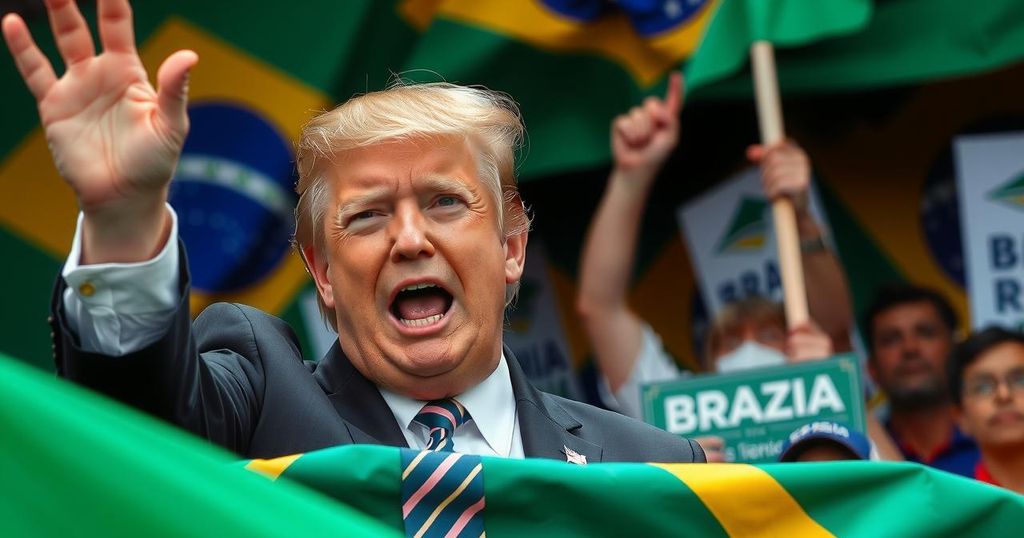Trump’s Victory: New Hope for Bolsonaro’s Political Ambitions in Brazil

Donald Trump’s election win has invigorated the hopes of former Brazilian President Jair Bolsonaro for a possible political comeback despite a court-imposed ban on him running for office until 2030. Amid rising dissatisfaction with current President Lula da Silva, Bolsonaro’s supporters believe Trump’s influence may aid their efforts to challenge the ruling party in the 2026 elections, reflecting broader implications for right-wing politics in Brazil.
The recent electoral victory of Donald Trump has sparked renewed optimism for former Brazilian leader Jair Bolsonaro, who is currently prohibited from holding public office until 2030 due to a ruling by Brazil’s Superior Electoral Court. Known for his right-wing populism, Bolsonaro, often referred to as the “Trump of the Tropics”, is alleged to have abused power and undermined the integrity of Brazil’s electronic voting system, leading to his ban. Despite this, Bolsonaro and his supporters are galvanizing efforts to overturn this judicial decision and aim to leverage Trump’s influence to challenge the current administration under President Luiz Inácio Lula da Silva in the 2026 elections.
Bolsonaro’s son, Congressman Eduardo Bolsonaro, expressed optimism regarding Trump’s presidency, stating that, “Trump’s victory goes far beyond being positive for democracy in Brazil and the world; it is good news for global peace.” He noted Lula’s previous condemnation of Trump, implying that Lula’s government may face challenges in maintaining its position amidst the political dynamics that Trump’s victory introduces. Lula’s allies have criticized the incoming Trump administration, highlighting further political polarization in Brazil regarding economic strategies and international relations, particularly concerning trade with the United States.
Despite concerns over economic stability, some believe that Bolsonaro’s re-election prospects may benefit from dissatisfaction with Lula’s governance. Economic indicators suggest that under Lula, Brazil has experienced rising inflation and increasing national debt, further alienating voters. A recent poll indicated that Bolsonaro could receive 39% of the vote against Lula’s 47%, yet these numbers remain hypothetical given his current ineligibility.
Political analysts argue that the increased hope for Bolsonaro comes amidst an environment where right-wing parties are expected to gain traction in the upcoming elections. Congressman Marcel van Hattem noted the potential for a resurgence of the right given Lula’s declining popularity and emphasizes that Trump’s victory affords new optimism to Bolsonaro’s supporters regarding the political landscape in Brazil.
The relationship between President Donald Trump and Brazil’s Jair Bolsonaro is marked by shared ideologies, particularly concerning economic policies and freedom of expression. Bolsonaro’s political career has been significantly affected by legal challenges, including a ban imposed by Brazil’s Superior Electoral Court that restricts him from seeking office due to allegations of electoral misconduct. As Brazil navigates its political future under President Lula, the implications of Trump’s electoral success may alter the dynamics of Brazilian politics, especially with rising economic concerns and populism among voters.
In conclusion, Donald Trump’s electoral victory represents a pivotal moment for Jair Bolsonaro’s political ambitions in Brazil. The renewed hope among Bolsonaro’s supporters and the potential for political realignment underline the significance of Trump’s influence on Brazil’s political landscape. While current legal constraints limit Bolsonaro’s ability to run for office, the discontent with Lula’s administration may pave the path for future right-wing candidates in Brazil.
Original Source: www.foxnews.com








